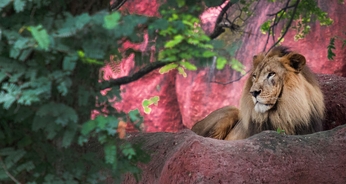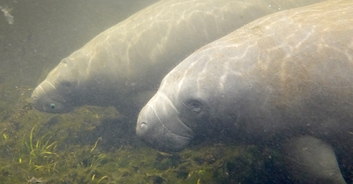Correction
We reported that Kenya is planning to introduce the death penalty for convicted wildlife poachers. This included a quote from Tourism Minister Najib Balala given to China’s Xinhua news agency, during a meeting held on May 10, 2018. However, Balala was not at that meeting, and told AFP Africa there was no such plan.We want to make clear that this was an editorial error and apologize profusely to our readers for this.
At VT we take false news very seriously and want to assure all our readers that our articles are fact-checked strenuously before publishing.Poaching is one of the world's least divisive issues. Almost everyone would agree that endangered animals should be allowed to live in peace - and roam their natural habitats without humans endangering their lives.
However, it remains a huge issue in African countries - including Kenya - where animals such as rhinos and elephants are targeted for their horns and tusks for alternative medicine and ivory, respectively. But the government is taking drastic steps to stem the bloodshed.
"We have in place the Wildlife Conservation Act that was enacted in 2013 and which fetches offenders a life sentence or a fine of U.S. $200,000," Cabinet Secretary for Tourism Najib Balala told China’s Xinhua news agency. "However, this has not been deterrence enough to curb poaching, hence the proposed stiffer sentence."

In 2017, poachers killed nine rhinos and 69 elephants - cancelling out the growth rate of their populations. The number of black rhinos in the country is now below 1,000. Balala added that the law to see poachers face the death penalty, while not yet enacted, was being fast-tracked.
“Across the continent’s diverse wild lands, management authorities need data-driven solutions to enhance anti-poaching capacity to allow remaining priority populations to recover from previous, and current, crises," stated the African Wildlife Foundation.
"Meanwhile," they continue, "community-level interventions must explore different economic opportunities that secure rather than destroy biodiversity as pressure on natural resources grows with increasing development, infrastructure, and urbanisation.”
Ghana, home to animals as diverse as lions, elephants and monkeys, is seeing the rapid spread of human life - as the metropolis leaches into the countryside. But the main problem here, as it is in large swathes of Africa, is traffic. Meetings and functions usually start 45 minutes late and locals joke that "GMT" stands for "Ghana Maybe Time".

In 2005, there were 159,000 registered vehicles in the country. Just 10 years later, there were already 890,000. Inevitably, as well as the impact on humans, wildlife is affected too - unless the animal in question is lucky enough to live on a protected wildlife reserve.
“Not only can KWS [Kenya Wildlife Service] catch wildlife criminals but now they have the capacity to ensure those criminals are convicted under Kenya’s robust laws," stated Max Graham of Space for Giants. "A ranger in the field should not have to experience the frustration of confronting a wildlife criminal they arrested a week earlier walking free again because of an acquittal. This is a critical step up in the battle against the illegal wildlife trade."

However, as to whether Kenya's decisive steps to protect wildlife are progressive is up for discussion. The United Nations (UN) opposes the death penalty. The UN General Assembly has recommended a phasing-out of capital punishment and the Office of the High Commissioner for Human Rights advocates its abolition worldwide.
Furthermore, the idea that poachers enjoy what they do is misconceived. In many cases, it may be the only way they can provide for their families - creating a difficult moral dilemma for those tasked with policing the situation.
Kenya’s tourism chiefs say that the number of poaching incidents has reduced thanks to investment in conservation and wildlife law enforcement. These individuals, dubbed wildlife "bodyguards", also helped to publicise the desperate fight against poaching.

“These efforts led to an 85 per cent reduction in rhino poaching and a 78 per cent reduction in elephant poaching, respectively, in 2017 compared to when poaching was at its peak in 2013 and 2012 respectively,” the ministry said.
"At current poaching rates, elephants, rhinos and other iconic African wildlife may be gone within our lifetime,” the African Wildlife Foundation states. They add that poachers “use high-powered technology and weaponry to track and kill many animals at once without being detected.”
However, conservationists are also turning to technological methods. Certain Kenyan rangers have started using thermal and infrared cameras in the hopes of spotting poachers before they spot their targets.

“In the past, we would never have found these people,” explains Brian Heath, who runs the conservation group the Mara Conservancy. “Now the poachers are saying it’s just not worth going out because the chance of getting caught is getting higher and higher. It has been a big deterrent. In other areas, like South Africa where most rhinos live, dozens of rhinos have actually been airlifted out of poaching-prone areas and into safer locales, like Botswana, where poaching is rare.”
Vietnam has typically been thought of as the dominant market for rhino horn, while up to 70 per cent of illegal ivory ends up in China, where it sells for up to $1,000 a pound. But there are also tonnes of it in the west, forming a burgeoning antique ivory market. That said, its future - at least as a legal trade - looks increasingly uncertain.
While not divisive as a conversation topic, poaching remains an important source of income for some of the world's most impoverished people. Unfortunately, the issue isn't straightforward and enacting the death penalty will be seen by many not as a step forward, but a step back.
If you would like to help protect endangered species, you can donate to Drive4Wildlife - a conservation group formed of three brothers from Britain's Paradise Wildlife Park who recently travelled through Africa to get a better perspective on the issue of poaching












